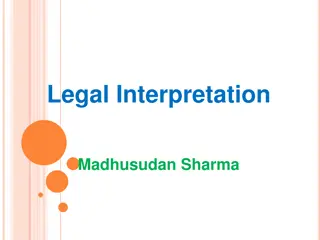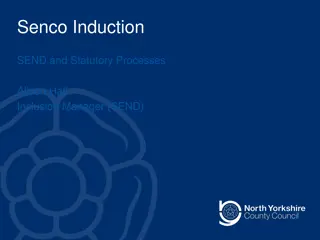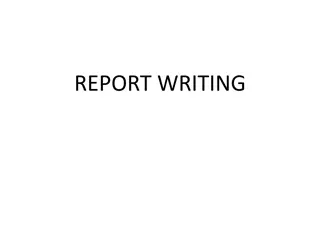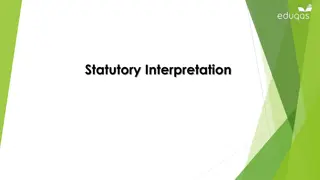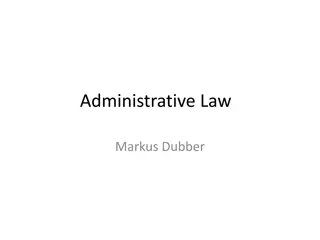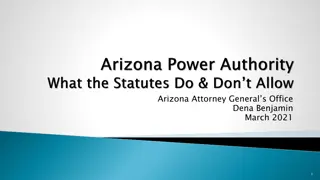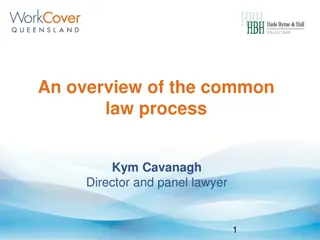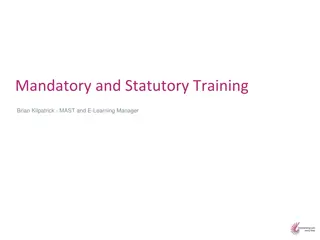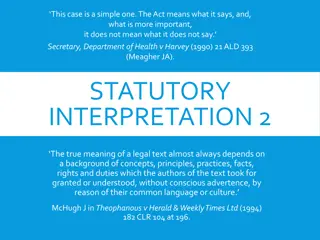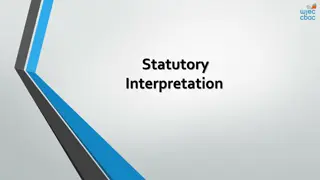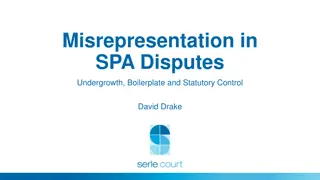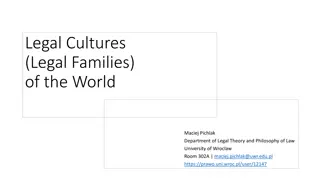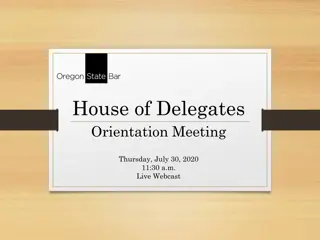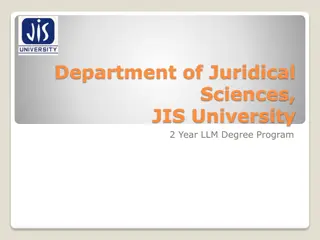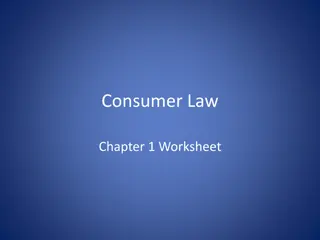Teaching Respectful Relationships: Primary and Secondary Curriculum Training Module
This training module focuses on teaching respectful relationships, including friendships, for primary and secondary school students. It covers key knowledge, strategies for handling class discussions, and ways to link topics across the curriculum. Schools can adapt this non-statutory guidance to com
2 views • 90 slides
Insight into Insolvency Law & Practice: Webinar Overview
Delve into a comprehensive webinar on Insolvency Law and Practice featuring Geoffrey McDonald, a seasoned Barrister at Law. The session covers various aspects including Insolvency and Taxes, Statutory Demands, Winding-up Applications, Liquidations, Insolvent Trading, and more. Discover key statistic
1 views • 58 slides
Differences Between Statutory Crown Entity Boards and Commercial or NGO Boards
Statutory Crown entity boards differ from commercial or NGO boards in terms of ministerial influence, funding limitations, public scrutiny, and government standards. The responsible Minister has more interaction, and boards have limited discretion in funding and pricing adjustments. Crown entities f
1 views • 19 slides
Safeguarding Statutory Reviews and Best Practices
Exploring the importance of learning from safeguarding statutory reviews in various domains such as child practice, safeguarding adults, and domestic homicide reviews. The content discusses the statutory requirements for review processes and the responsibilities of relevant agencies in cases of abus
0 views • 7 slides
Core Area of Statutory Bank Branch Audit and Review of Advances by Hitesh Pomal
Explore the core areas of statutory bank branch audit, advances, NPAs, types of advances, review of advances, and considerations during the review. Learn about sanctioned terms, parameters, consortium advances, and frequent MOCs reported by auditors. Understand IRAC norms regarding income recognitio
0 views • 28 slides
The National Approach to Statutory Advocacy for Children and Young People
Exploring the significance of the National Approach to Statutory Advocacy for Children and Young People, this content delves into the role of advocates, the UN Convention on the Rights of the Child, and the fundamental principles guiding statutory advocacy. Learn about different types of advocacy, u
2 views • 44 slides
Gas Laws: Boyle's, Charles', Gay-Lussac's, and Avogadro's Laws
Gas laws such as Boyle's Law, Charles' Law, Gay-Lussac's Law, and Avogadro's Law govern the behavior of gases under different conditions. Boyle's Law relates pressure and volume at constant temperature, Charles' Law relates volume and temperature at constant pressure, Gay-Lussac's Law relates pressu
1 views • 19 slides
Impact Evaluation of Statutory Instrument 64 of 2016 on Consumer Prices in Zimbabwe
Statutory Instrument 64 of 2016 in Zimbabwe regulates the importation of various products to promote local production. The legislation does not ban imports but requires licensing for bulk importers. The consumer prices of certain goods increased post-implementation, influenced by factors beyond SI 6
0 views • 14 slides
Legal Interpretation and Statutory Construction Guidelines
Legal interpretation and statutory construction present challenges when new laws are enacted. Courts must interpret statutes based on their popular sense, literal construction, and mischief rule to achieve the intended purpose. Sometimes, even clear language can pose difficulties in legal cases.
0 views • 9 slides
Statutory Assessment and Processes in Special Education
Understanding the statutory assessment process for children and young people with special educational needs and disabilities (SEND), including who can make requests, the steps involved, and the importance of EHCPs. Learn about the roles of casework managers and officers in assessing needs, providing
1 views • 15 slides
Overview of EHCP Processes and Statutory Assessment Team
This content provides detailed information on EHCP processes, including the role of the Statutory Assessment Team, the number of EHCPs maintained over the years, and the responsibilities of Casework Officers in the assessment and review process. It covers the statutory assessment process, the involv
0 views • 42 slides
Mastering Academic and Research Report Writing
Academic and research report writing is a crucial skill for modern educators. This course covers principles, techniques, and tools for effective dissemination of findings. Learn about the meaning of reports, classification, steps for writing, layout, and mechanics of research reports. Understand the
0 views • 45 slides
Contrasting Legal Systems Around the World
Explore the diverse legal families globally, such as Civil Law (Romano-Germanic) and Common Law (Anglo-American), along with their historical backgrounds, sources of law, and dominant ideologies. Delve into the distinctions between Civil Law and Common Law, their origins, development, and practical
0 views • 17 slides
Intergovernmental Relations in Kenya
Intergovernmental Relations (IGR) in Kenya involve interactions between government entities within a decentralized system. This presentation outlines the institutional framework, disputes, progress of audits, and assets/liabilities in IGR. It emphasizes the importance of statutory and non-statutory
2 views • 44 slides
Legal Update on Statutory Cap for Cities and Counties in Alabama
Alabama's statutory cap on damages against cities and counties has been a topic of contention since its enactment in 1977. Attempts to circumvent this cap by suing city or county employees individually have led to legal debates and court decisions, such as the cases of Morrow v. Caldwell and Alabama
1 views • 36 slides
Statutory Interpretation: Rules, Approaches, and Challenges
Explore the concept of statutory interpretation, including the intention of Parliament, problems that can arise, various rules and approaches used in interpretation, aids and presumptions, criticisms, and the relationship between statutory interpretation, EU law, and precedent. The Literal Rule, a c
2 views • 26 slides
Trust Modifications: Best Practices and Pitfalls
Common law allows for modification of irrevocable trusts with consent from settlor and beneficiaries, but changes must align with trust purpose. Recent trends show more flexibility in trust modifications, with new statutory remedies and tools like decanting and nonjudicial settlement agreements. How
0 views • 19 slides
Three Approaches to Statutory Interpretation in Administrative Law
Explore the concepts of Ordinary Meaning, Context, and Three Approaches to Statutory Interpretation in Administrative Law through insightful discussions and relevant examples. Gain a deeper understanding of legal interpretation principles and their application in legal frameworks.
1 views • 14 slides
Combined Gas Law and Ideal Gas Law for Final Exam Preparation
Explore the concepts of Combined Gas Law, Boyle's Law, Charles's Law, Gay-Lussac's Law, and their reflection in the Ideal Gas Law. Learn how to solve problems using these laws, prepare for your final exam scheduled for Tuesday, December 12 at 12:30 in the specified room. Dive into in-class practice
1 views • 23 slides
Overview of UK Law: Statute Law, Common Law, Criminal Law, Civil Law
Statute Law is written law created through the parliamentary process, forming the basis of the legal system. Common Law, on the other hand, is unwritten law based on judicial decisions and precedents. They govern different aspects such as civil and criminal matters, each with its unique characterist
1 views • 15 slides
Overview of Arizona Attorney General's Office Statutory Authority
The Arizona Attorney General's Office, represented by Dena Benjamin in March 2021, holds broad statutory authority subject to specific regulations and oversight. The office must adhere to various laws and regulations, file annual budgets, conduct audits, and comply with legal requirements in its ope
0 views • 26 slides
Descriptive Analysis of Statutory Notifications from Residential Care Facilities in Ireland
This study conducted by Stephanie O'Regan, a Research Assistant at HIQA, presents a descriptive analysis of statutory notifications from residential care facilities for older persons and people with disabilities in Ireland. The research explores the types of adverse events reported, trends in notifi
0 views • 30 slides
Guide to Common Law Process in Worker's Compensation Cases
Explore key aspects of the common law process in worker's compensation cases, including the definition of an injury and a worker, the difference between statutory and common law claims, employer's duty of care, requirements for pursuing a common law claim, and the typical course of action in such ca
0 views • 35 slides
Mandatory and Statutory Training Overview
Mandatory and Statutory Training (MAST) is essential for all staff to ensure compliance and competence in areas like Fire Safety, Health, Infection Prevention, and more. This training is guided by Brian Kilpatrick, the MAST and E-Learning Manager, and covers accessing the MAST system, checking compl
0 views • 10 slides
The Continuing Relevance of English Law to Irish Corporate Law Reform
English Law remains relevant in Irish corporate law reform, impacting areas like takeover regulation, deferred prosecution agreements, schemes of arrangement, and the comply or explain approach. The influence of English law is seen where there is no EU law dimension or when EU legislation allows mem
1 views • 10 slides
Types of Companies in Corporate Administration
This article discusses the various kinds of companies in corporate administration, including incorporated, chartered, statutory, and registered companies. It covers the definition of a company, different types of legal entities, and examples of each type. The classification of companies based on inc
0 views • 17 slides
Principles of Statutory Interpretation in Legal Context
Understanding statutory interpretation involves analyzing legal texts in light of background concepts, principles, and legislative intent. This process requires considering various factors to determine the true meaning of a statute. Different cases and statutes are referenced to illustrate the compl
0 views • 15 slides
Classification of Law: Understanding Different Types and Functions
Exploring the classification of law is essential for understanding the diverse nature of legal systems. This overview delves into domestic law vs. public international law, public law vs. private law, and the sub-divisions within public law, such as constitutional, administrative, and criminal law.
0 views • 19 slides
Approaches to Statutory Interpretation: The Literal Rule
The Literal Rule in statutory interpretation mandates that all words in a statute be given their ordinary and natural meanings, even if the result seems absurd. This approach emphasizes following the clear wording of the law as enacted by Parliament. Advantages include respecting parliamentary sover
0 views • 26 slides
Misrepresentation in SPA Disputes: Undergrowth, Boilerplate, and Statutory Control
Claimants in misrepresentation disputes often struggle through obscure details to build their claims. Boilerplate clauses like No-Reliance and Entire Agreement aim to prevent such claims. Legal principles like contractual estoppel can bind parties to false statements. Statutory control under the Mis
0 views • 11 slides
Overview of Legal Systems and Roman Law Development
Legal systems play a crucial role in governing societies, with Roman Law, Common Law, Civil Law, and Religious Law being some of the major types worldwide. Roman Law, focusing on private law, has influenced legal traditions in various regions, especially in Europe. Contrasting Common Law and Civil L
0 views • 26 slides
Comparative Analysis of Legal Families Around the World
Explore the diverse legal cultures and families existing globally, including Civil Law, Common Law, Far East, Islamic, Hindu, and more. Learn about the historical background, methods of reasoning, institutions, sources of law, and dominant ideologies that characterize each legal family. Delve into t
0 views • 17 slides
Self-Defence Law: Necessity and Statutory Defences
Self-defence is a crucial aspect of criminal law, encompassing actions taken to protect oneself or others from harm. This includes both common law defences and statutory provisions such as those outlined in the Criminal Law Act 1967. The law allows individuals to use reasonable force in circumstance
0 views • 11 slides
Pest Management Regulatory Approaches for Lakes Water Quality Workshop
Explore the regulatory framework for pest management in lakes, highlighting the role of councils, statutory and non-statutory plans, regional pest management strategies, and pest control programs. Discover key elements such as biosecurity objectives, statutory requirements, and the importance of col
0 views • 13 slides
Overview of Oregon State Bar: House of Delegates Orientation Meeting and Statutory Purpose
This content provides insights into the upcoming House of Delegates orientation meeting happening on July 30, 2020. It covers information about the Oregon State Bar, its role in serving justice and the public interest, its statutory purpose, Keller fees, OSB Bylaw 12.1 on legislation and public poli
0 views • 18 slides
2-Year LLM Degree Program in Juridical Sciences at JIS University
Explore the 2-year LLM degree program offered by the Department of Juridical Sciences at JIS University, specializing in Corporate Law, Criminal Law, and Constitutional Law. The program covers a range of specializations such as Comparative Criminal Law, Human Rights, Corporate Law, Competition Law,
0 views • 7 slides
Expectations and Responsibilities of Board Members in Statutory Entities
Board members of statutory entities are collectively expected to ensure consistent and effective entity performance, financial responsibility, and collaboration. Individually, they must act with integrity, comply with legislation, and avoid conflicts of interest. Boards have a crucial role in monito
0 views • 5 slides
Consumer Law: Enactment and Application of Laws
This comprehensive worksheet delves into the different types of laws such as Constitutional Law, Statutory Law, Administrative Law, Case Law, and Ordinances. It provides insights on who enacts these laws and explores scenarios to determine the type of law that would likely apply. Enrich your knowled
0 views • 19 slides
Federal Sentencing Principles
Federal sentencing is determined by various factors including the applicable sentencing statute, statutory maximum and minimum terms of imprisonment, fines, supervised release terms, special assessments, the U.S. Sentencing Commission Guidelines Manual, judicial discretion, and factors outlined in 1
0 views • 26 slides
Proposal for Statutory Change to Amend Fee Structure for Kentucky Board of Licensure for Massage Therapy
Kentucky Board of Licensure for Massage Therapy requests a statutory change to update its fee structure, which has not been revised since 2003, leading to insufficient revenue to cover operational costs. The Board aims to generate necessary funds through license fees to sustain its services and agre
0 views • 9 slides

